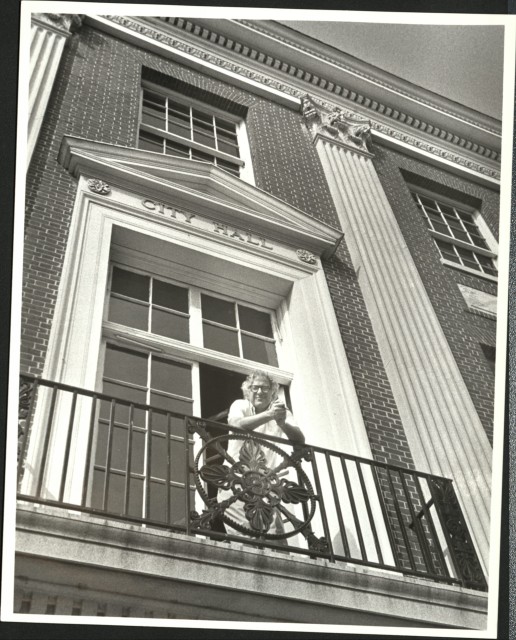
Mayor Bernie Sanders on a City Hall porch in Burlington, Vt., in the 1980s. Photo courtesy of University of Vermont Library
(RNS) As mayor of Burlington, Vt., Bernie Sanders took a decisive stand on a religious liberty question, supporting the placement of a Hanukkah menorah on public property, according to documents discovered by an Orthodox Jewish religious group.
Sanders, now a United States senator from Vermont who is seeking the 2016 Democratic presidential nomination, ordered city attorneys to defend the erection of the giant menorah on the steps of Burlington’s City Hall. The display was part of a campaign by Chabad Lubavitch, a Hasidic branch of Judaism.
The controversy began on Dec. 1, 1983, when Sanders put on a yarmulke, “flawlessly read the blessings aloud, and lit two candles on the steps of City Hall,” according to a Chabad.org report. Several dozen Jewish students from the University of Vermont attended, the group said.
Chabad has also obtained permission to place menorahs in other prominent locations during the holiday season, including in Washington, in a public park just south of the White House where a Christmas tree is also displayed.
In Burlington, Sanders’ move angered the local branch of the American Civil Liberties Union, which allied with the mayor on other issues, and brought a rebuke from then-Gov. Madeleine Kunin, who also is Jewish. The ACLU sued Burlington over the placement of the menorah — by then on a City Hall plaza — saying the move amounted to a government “establishment” of religion.
U.S. District Judge Franklin Billings ruled on Nov. 30, 1988, that the plaza was a public forum and the menorah could stand. The 2nd U.S. Circuit Court of Appeals overturned Billings’ ruling because the menorah stood alone and was a de facto endorsement since the City Hall building was in the background.
John Franco, an assistant city attorney in the Sanders administration, later recalled the mayor’s determination in the case: “I cannot be emphatic enough in expressing how much Lubavitch was in its rights to put up a menorah,” he told a Chabad.org writer. “To us it was never even a question; it was clearly a First Amendment case and we were going to fight for their rights to do so. It was never a consideration not to.”
Sanders moved from the mayor’s office to the U.S. House of Representatives in 1990 and was elected to the Senate in 2006. His victory in New Hampshire this week over former Secretary of State Hillary Clinton makes him the first Jewish American to win a U.S. presidential primary.
(Mark A. Kellner is an RNS correspondent)




